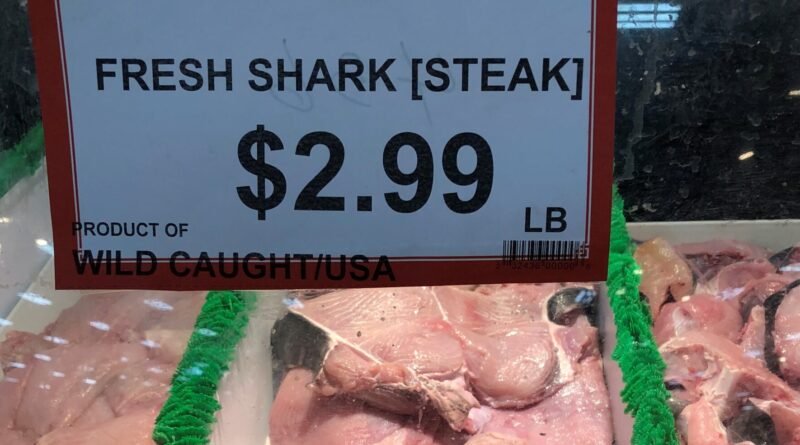Shark Meat Sold Under Generic Labels Hides Endangered Species
Today, many shark species are classified as endangered or critically endangered. Finning, habitat loss, pollution, overfishing, and now the sale of protected species highlight a troubling reality: despite repeated warnings, IUCN listings, international bans, and regulations, sharks remain unprotected.
According to scientists from the University of North Carolina at Chapel Hill who authored a new study, “Sale of critically endangered sharks in the United States,” meat from a shark species threatened with extinction is being sold in the United States. Marketed under a generic label, this meat can be purchased by consumers without them even realizing what they are buying.
As they explained, the purpose of the study was to quantify the identity of “shark” meat sold in the United States. So they purchased 30 samples from grocery stores and online jerky vendors in Washington, DC, North Carolina, Florida, and Georgia. Thanks to standard DNA barcoding techniques, a method that allows scientists to identify species based on their unique DNA, like a unique ID number, they were able to identify 29 of the 30 samples to the species level (meaning they knew the exact species of each sample).
The results showed that even Critically Endangered sharks are accessible to consumers in grocery stores. To be precise, 31% percent of the bought samples turned out to be from four endangered or critically endangered species: great hammerhead, scalloped hammerhead, tope, and shortfin mako shark.
Scalloped hammerhead, great hammerhead, and dusky smooth-hound shark are known to contain high levels of mercury and methylmercury. For example, studies show that infants in the womb can be exposed to methylmercury when their mothers eat contaminated fish and shellfish, which can affect unborn infants’ growing brains. Additionally, of the 29 samples that were identified, 93% were labeled ambiguously, and one of the two products labeled was found to be mislabeled. “When consumers are purchasing ambiguously labeled or mislabeled shark meat, they have no way to know what species they are consuming and what the associated health risks might be,” they warned in the study.
The price was between $6.56 and $11.99 per kilogram for fresh shark meat, and on average $207.37 per kilogram for shark jerky.
Savannah J. Ryburn, a marine ecologist with a Ph.D. from the University of North Carolina at Chapel Hill and one of the study’s authors, commented on the study for Unknown Focus.
“However, by the time large shark species reach grocery stores and markets, they are often sold as fillets with all distinguishing features removed, making it unlikely that sellers know what species they are offering.”
Why is the price so low, given such a high risk? Does this mean that, when it comes to illegal hunting, enforcement is not strong enough? And on the other hand, does it also indicate that stricter controls, starting with sanitary regulations, are needed?
Savannah J. Ryburn: Shark meat has a large amount of urea, so it doesn’t smell very good, and for it to taste palatable, usually people soak it in milk to neutralize the urea before cooking it. Additionally, due to the shark finning industry, regulations have been implemented where fishing vessels are required to land the entire shark body rather than just cutting off the fins (the valuable part of the shark) and tossing the rest of the body back into the water. This limits the number of sharks a fishing vessel can catch at one time since the shark bodies take up a lot more space compared to just the fins. However, this has caused shark meat to become more prevalent in the market.
Not all shark fishing is illegal. The legality of selling shark meat in the United States depends largely on where the shark was harvested and the species involved, due to regulations under CITES and the Endangered Species Act. However, by the time large shark species reach grocery stores and markets, they are often sold as fillets with all distinguishing features removed, making it unlikely that sellers know what species they are offering.
“This is a global issue. Many countries have generic slang terms for shark meat, and sometimes people don’t even realize that the slang term is referring to shark meat.”
What particularly surprised you in your findings? Is there a risk that this issue could spread beyond the borders of the USA? What would the situation look like in that case?
Savannah J. Ryburn: We were definitely surprised by finding three critically endangered species and species that have dangerously high levels of mercury in the tissue in such a small sample size of 29. It’s also very concerning that most of our samples were initially labeled ambiguously as “shark”. This takes away the consumer’s choice of what they are putting into their bodies.
This is a global issue. Many countries have generic slang terms for shark meat, and sometimes people don’t even realize that the slang term is referring to shark meat. There are multiple examples of studies that have interviewed people asking if they ate whatever the slang terminology for shark meat was in that region (e.g., tollo in Peru), and people say yes, but when asked if they eat shark, they say no. In South Africa shark is sold as “ocean filets’’ or “skomoro”; in Brazil elasmobranchs (i.e., sharks, skates, and rays) are sold as “cação”; in Australia shark is sold under the term “flake”; in Mexico shark meat is sold as “cazon”, and in the United Kingdom small sharks are commonly sold as “rock salmon”, “huss”, “rock eel”, and “rigg.”
What can you do?
“Consumers should avoid purchasing products that lack species-level labeling or traceable sourcing.”
Savannah J. Ryburn: Accurate, verified product labels for shark meat would benefit consumers and shark conservation efforts, and should be a priority for the seafood industry. Sellers in the United States should be required to provide species-specific names, and when shark meat is not a food security necessity, consumers should avoid purchasing products that lack species-level labeling or traceable sourcing.
The scientists in the study also noted that due to the limited sample size, future work should include larger, more geographically dispersed sampling to better characterize the sale of shark products. Although the IUCN SSC Shark Specialist Group (SSG) was established in 1991, decades of awareness and conservation efforts still leave much work to be done.
Image: Savannah Ryburn, PhD/Study


